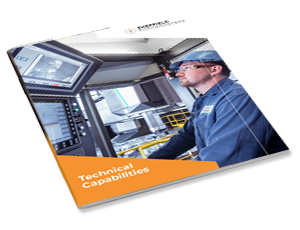Sheffield Forgemasters has over 200 years’ experience in forging high quality steel components. Comprehensive techniques allows us to create hollow, solid and near-net shaped forgings up to 300 tonnes.
Sheffield Forgemasters can trace its first forges back to the late 1800's when Tom Vickers introduced the first heavy forging press.
The company has advanced significantly from this point and now includes two open die forging presses, 4,500 tonne and 10,000 tonne which are capable of handling ingots up to 300 tonnes.
10,000 tonne Open Die Hydraulic Forging Press
Capable of complex forgings up to 300 tonnes.
Max Dias - Discs – 5080mmØ | Tubes – 3050mmOD x 1900mmID | Rings 5560mmOD x 4900mmID | Shafts 2100mmØ | Collars 3048mmØ
Min Dia - 355mmØ
Max Length - 19800mm


10,000 tonne Open Die Hydraulic Forging Press
Capable of complex forgings up to 300 tonnes.
Max Dias - Discs – 5080mmØ | Tubes – 3050mmOD x 1900mmID | Rings 5560mmOD x 4900mmID | Shafts 2100mmØ | Collars 3048mmØ
Min Dia - 355mmØ
Max Length - 19800mm

Fully integrated manipulators and turning gear are used for rotating during forging.
We have cranes that allow us to move components up to 330 tonnes, as well as a 120 tonne service crane.

Fully integrated manipulators and turning gear are used for rotating during forging.
We have cranes that allow us to move components up to 330 tonnes, as well as a 120 tonne service crane.
Large gas fuelled re-heat furnaces are used for heating the materials to temperature prior to forging, usually around 1,250°C. Electrical overhead cranes, with lift attachments, are used to transport ingots directly from the re-heat furnaces to the press to avoid a reduction in temperature.
The forging of large ingots requires multiple forging stages and intermediate re-heating to achieve final size.


Large gas fuelled re-heat furnaces are used for heating the materials to temperature prior to forging, usually around 1,250°C. Electrical overhead cranes, with lift attachments, are used to transport ingots directly from the re-heat furnaces to the press to avoid a reduction in temperature.
The forging of large ingots requires multiple forging stages and intermediate re-heating to achieve final size.

Our forge is equipped with vertical oil and water quenching facilities up to 20 metres deep. This allows hot components to be transferred directly from the forge or from heat treatment, into a quench tank.

Our forge is equipped with vertical oil and water quenching facilities up to 20 metres deep. This allows hot components to be transferred directly from the forge or from heat treatment, into a quench tank.
View and download our Brochures
